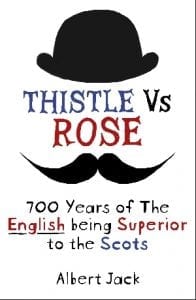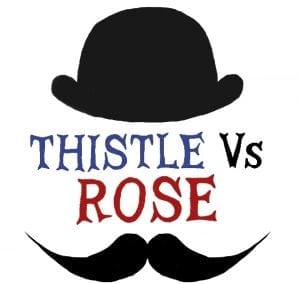There was something about the 2014 referendum that felt a little bit like marriage counselling.
Scotland: the flighty wife, tired of always being the butt of jokes at dinner parties, never getting to watch what she wants on the telly, never getting the spotlight, thinks she’s outgrown old reliable England. ‘You’re boring’, she claims, ‘stuck in your ways. You never tell me how you feel. I want excitement, I want change, I want my independence back’.
And we stand there, pretending to be shocked and hurt, but we can’t lie; we’ve seen it coming for a while. We don’t really care. We can’t remember the last time we agreed on anything: football, politics, what constitutes a healthy, balanced diet.
Read – My England My Scotland
We’re sick of all that deep-fried food she keeps cooking us, sick of her extravagant, rolling Rs, sick of hearing about Bannockburn again, every time she’s had a bit too much to drink. Sitting there, on the therapist’s couch, I want to recount the ups and downs of Anglo–Scot relations.
The earliest acknowledgement of tension between the cultured people of southern Albion and the warring barbarians from the Highlands came with the Romans, who built two huge walls to keep them apart: the Roman emperor Hadrian knocked up the first in AD 122 and then Antoninus Pius the second, which extended much deeper into Scotland, in AD 142.
Traditionally these have been seen by historians as a desperate defence against the blue-faced barbarians they could never conquer; but it turns out that, actually, the north of England was just about as far as the Romans wanted to go. There was nothing to tempt them across the border.
Fragments of letters have recently been discovered from Roman soldiers stationed on the walls – none of them mention nightmares of fearsome Scots, though one contains a desperate plea for more warm socks.
Hadrian’s Wall was never designed to prevent migration or to repel invaders, but was erected as a way of regulating and taxing imports. Scotland might like to brag – at the pub, pint of whisky in hand – about how fearsome its warriors were, but no legion was ever stationed at Hadrian’s Wall; only customs soldiers.
 Over the next thousand years things plodded along calmly enough. The Scots kept their hand in with a little light raiding of English cattle, but otherwise we coexisted like good neighbours (if good neighbours with a hefty fence between us).
Over the next thousand years things plodded along calmly enough. The Scots kept their hand in with a little light raiding of English cattle, but otherwise we coexisted like good neighbours (if good neighbours with a hefty fence between us).
But their first really ambitious move was when Scots king Malcolm III challenged England’s, that bastard William (sorry, I mean William the Bastard), in 1072. When William grumpily reached the Scottish borders, Malcolm (whose nickname was Big Head) employed the shrewd tactic of immediately surrendering.
But it was all part of a cunning master plan to destabilise England. By 1075 William’s own earls were revolting and within ten years he was dead.
After that our relationship was on rocky territory. Neither side trusted the other. If mobile phones had existed back then, you could bet that England would be sneaking a look at Scotland’s texts every time she left the room.
England’s preferred enemy has always been the French, but spending every summer fighting in Normandy could drag. In 1296 Edward I clearly wanted a change and so he invaded Scotland and deposed King John.
A certain William Wallace (so memorably and inaccurately captured in the tartan-clad blockbuster Braveheart), offered up some resistance at the Battle of Stirling Bridge, but the aptly named Hammer of the Scots soon had him hung out to dry – in five different locations.
In 1314 Robert the Bruce, one of Edward’s trusted commanders, was sent north to police the Highlands. But he decided to change sides along the way. He surprised the Hammer’s son, Edward II (sadly more of a spanner) at Bannockburn and, much to their surprise, the English were trounced.

The first Parliament of Scotland met and, two years later, Edward III (more of a sledgehammer) signed the Treaty of Northampton, which recognised Scottish independence. But he was only joking and invaded the following year.
Scotland bided her time, grumbling to anyone who would listen about how mistreated she had been, and waited for the English to get distracted. When Henry VIII declared war on France in 1513, Scotland grabbed her moment and promptly invaded the north of England.
This wasn’t a success: they were promptly crushed at the Battle of Flodden Field and those few left alive limped home and continued plotting revenge.
Here’s a name that pops up every time we fight: Mary, Queen of Scots. When Mary married the French dauphin in 1558 the English were alarmed: our two ancient Catholic enemies were uniting.
But the French prince died young and Scotland’s beautiful princess turned out more Lindsey Lohan than Grace Kelly. Eventually she ran away from Edinburgh Castle and Elizabeth I’s England was the only place that would take her in (and looked after her for twenty years).
But, still unsatisfied with her comfy Yorkshire castle, Mary plotted revenge (unsuccessfully) against her cousin, Elizabeth, and was beheaded for treason.
But she had the last laugh. When Elizabeth died childless in 1603, Mary’s son James inherited the crown and Scotland and England were united (unsurprisingly, James left Scotland as soon as he could and never went back).
Unfortunately, England’s new Scottish royal family proved neither steady nor popular. James’ son Charles I, a Laurence Llewelyn-Bowen type of a king more famous for his flamboyantly ruffled collar than his parliamentary prowess, proved such a poor king that after a civil war that claimed around 200,000 lives, the English parliament tried him for treason and chopped his head off.

The Stuarts got another chance with Charles II, but when he died without an heir and his very unpopular brother inherited the throne, England decided they’d rather have a Dutchman named after a fruit than another Scot.
England was in a reconciliatory mood, keen to patch things up, and so, in 1707, offered the political equivalent of a diamond ring: the Act of Union. We weren’t just great, we were Great Britain.
Not everyone was happy with this and Scottish nationalists claimed the Scottish signatories were bribed. The poet Robert Burns later wrote: ’We are bought and sold for English gold. Such a parcel of rogues in a nation.’
In 1745 the last of the Stuarts, the self-styled Bonnie Prince Charlie, capitalised on Scottish anger about the Act of Union and raised an army in the Highlands to claim the Scottish and English throne.
But unfortunately for the Scots he wasn’t much of a soldier and wimpishly stationed himself so far behind the battle lines that he couldn’t actually see what a terrible mess he’d made of battle strategy.
When his army met the English forces at Culloden they were completely crushed. Bonnie Prince Charlie escaped to Europe, dressed as a girl, leaving his supporters to face the extremely unpleasant consequences of their rebellion. Laws were passed condemning any man who wore a kilt to seven years in prison or transportation (this was the original crime against fashion).
The English then began a brutal land-grab that became known as the Highland Clearances, an atrocity remembered by a ten-foot bronze statue in Sutherland and, less surprisingly, a urinal in a Glasgow pub bearing the names of those responsible so that customers can show their appreciation.
So, Scotland, you want to be your own country. Well, fair enough, but who are you going to turn to when things aren’t going your way? That old historical ally, France? Spain perhaps? Maybe Ireland? That’s a rhetorical question because we all know, don’t we?
Once she’s had her fun – travelled the world, got a tattoo and spent all her money – she’ll come back to us. And will we help her? The answer is probably yes, because that is the English way.
Despite generations, or even centuries, of Scottish insults and attacks, she can rely on our support when she needs it. It’s the small-island mentality that has repelled would-be invaders for thousands of years and built up a defensive mentality.
It is why we do not learn other languages, are hostile to foreign tourists, will not listen to their music with any enjoyment and think their bathrooms are a disgrace.
Scotland, we know we’ve been harsh at times. We know we’ve been distracted, unfair and dismissive. But do you really want to call it quits? You still look great in that tartan skirt you always wear. Couldn’t we put our differences aside and be great (Britain) again?
Albert Jack
